If you’re looking for a role model, TV’s very best was Richard Kimble, the main character on the 1960s drama, The Fugitive. Yes, TV has plenty of excellent roles models to choose from, and, yeah, Kimble was an escaped prisoner, convicted of murder, on the run from the police and especially the dogged Lieutenant Philip Gerrard.
But if you want a role model and somebody to emulate in order to better yourself, Kimble’s your guy.
He was innocent, of course. The narrator in the opening credits of The Fugitive made that clear every week, and after watching Kimble run around from episode to episode, you would have known anyway. There was no way this guy murdered his wife.
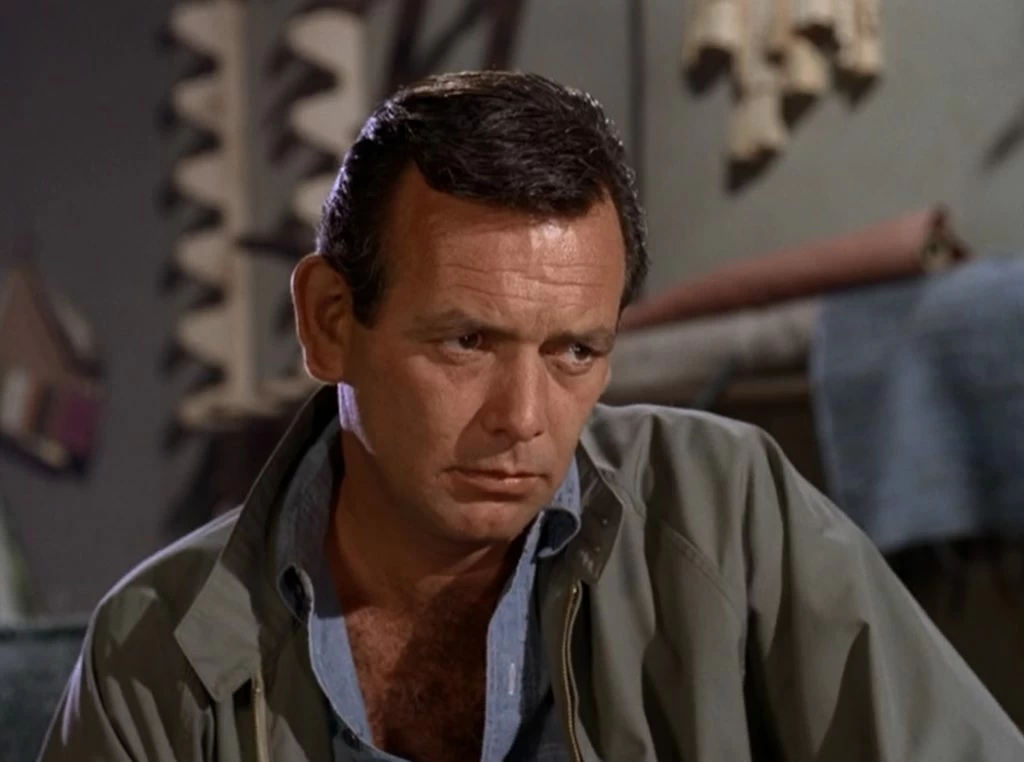
Now, of course, if you’re familiar with the series, and you're thinking to yourself – "OK, he’s an outstanding guy, but Richard Kimble did escape from the police and spent four seasons of The Fugitive eluding capture from the police. That’s against the law. He should have turned himself in." -- then, well, there’s no reason for you to continue reading this. If that’s your stance, congratulations. You have some extremely high standards. And you would have gotten along just fine with Lieutenant Philip Gerard.
But from Kimble’s reasoning, he had been tried in a court of law, and a jury found him guilty, despite his protestations that a one-armed man ran from his house moments before he found his wife at home, murdered. If Kimble turned himself into the police, he was essentially committing suicide. He would go straight to Death Row – for a crime he didn’t commit.
Once fate intervened, causing a train he was on to crash, you can hardly blame him for escaping and staying on the run and searching for the one-armed man in order to prove his innocence.
So assuming you feel that his eluding the police was ethical, in this case, I think you’ll agree with these six reasons Richard Kimble should be everybody’s role model.
Today's "TV Lesson" Breakdown:
- It isn’t safe for Richard Kimble to be around people, and yet he is always helping them.
- Everybody’s life is worthwhile in The Fugitive – Richard Kimble doesn't care about your status
- Family is important to Richard Kimble.
- Yet another role model trait: Richard Kimble doesn’t waste his talents.
- Kimble stands up for himself.
- Richard Kimble is ethical – even when it’s inconvenient.
It isn’t safe for Richard Kimble to be around people, and yet he is always helping them.
Throughout The Fugitive, Kimble drifts from town to town, finding work and trying to keep to himself. And yet if he’s able to make a difference in somebody’s life, he does exactly that.
For instance, in “Terror at High Point,” in the first season, Dr. Kimble, posing as Paul Beaumont, a timekeeper on a construction crew, befriends a coworker, Jamie, who has a learning disability.
Many of the construction workers make fun of the young man – but not Kimble, who is constantly looking out for him. In fact, we learn that Kimble got him the job. Jamie (Buck Taylor) walked 20 miles from home one day and came to the construction site, located near Salt Lake City, and asked around for work. Kimble thought that was a fine idea and managed to convince Buck Harmon (Jack Klugman), the owner of the construction company to hire Jamie.
Think about that. Kimble is on the run for his life – and once he finds this job, the last thing he should be doing is getting too involved in other people’s lives. Yet Kimble takes the time to convince a gruff construction worker to hire one of society’s most vulnerable members. He even apparently introduces Jamie to Buck’s wife, Ruth, who then becomes his reading tutor. During Kimble’s free time, he goes hiking with Buck. And when some tough guys on the construction crew make fun of Buck and one pushes him in the mud, Kimble sticks up for Buck and gets in a fight.
It's really an amazing episode in terms of the good Kimble does before he, as he always does, goes back on the run once again. He ends up saving Jamie’s life. He helps to catch somebody who sexually assaulted Ruth – and indirectly, he saves Buck and Ruth’s marriage.
Granted, Richard Kimble is a doctor. He's doing what doctors do -- helping people. He also a pediatrician, so it's understandable that he would particularly take an interest in helping Jamie. But, again, as role models go, it's probably impossible to top Richard Kimble.
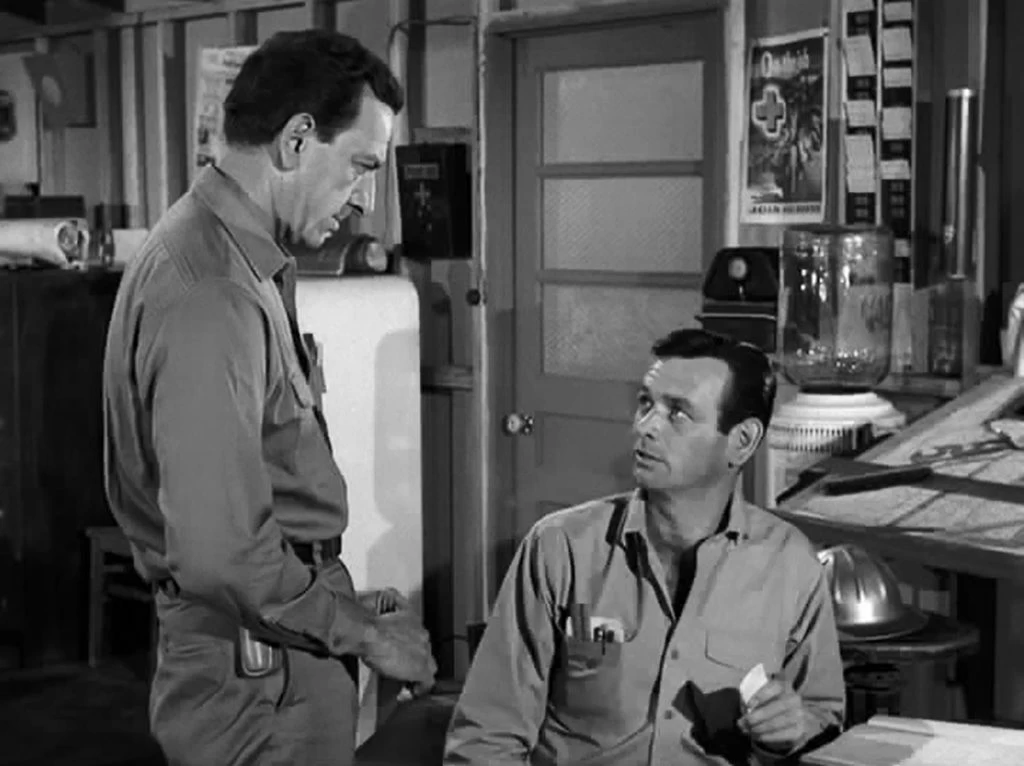
Everybody’s life is worthwhile in The Fugitive – Richard Kimble doesn't care about your status
In The Fugitive episode, “Glass Tightrope,” Kimble – this time going by the alias Harry Carson – witnesses an unintentional murder. A CEO, Martin C. Rowland (Leslie Nielsen, future star of The Naked Gun movies) slugs a guy in a parking lot. Rowland then leaves, angry but thinking that the executive he is okay. Unfortunately, he isn’t, and a homeless man is later arrested and blamed for the murder.
The elderly transient came across the body and lifted the guy’s wallet, and when the police find him, they naturally think they’ve found their murderer.
Rowland, meanwhile, figures that nobody will ever connect him to the accidental murder, but his conscience won't let him the hook. Nor will Kimble.
Kimble knows that sticking around town and trying to convince the CEO to turn himself in is an excellent way for himself to be caught. He does it, anyway. Meanwhile, Rowland, his wife and the store detective – kind of Rowland’s assistant or henchman – all believe Kimble is trying to blackmail Rowland.
Later, however, Rowland learns that his wife offered Kimble a new, better job or the chance to leave the area with $10,000 – and that Kimble wouldn’t take it. And later, thanks to the sleuthing of the store detective, Rowland learns that Kimble is wanted for murder.
That’s when Rowland realizes the spot Kimble has put himself in.
“You took a chance for like this for an old, useless drunk who you didn't even know?” Rowland asks, incredulous.
Inspired, Rowland ends up turning himself into the police – and makes it clear to the store detective that he is going to forget all about Kimble. One wonders if the wife, who isn’t so charitable, will, but in any case, Rowland buys his new friend enough time that Kimble is able to leave the building – with a clear conscience. The homeless man will be declared innocent of murder.
Really, The Fugitive, as much as anything, was a series about ethics. There was almost always an ethics dilemma in The Fugitive, and Kimble generally always passed with flying colors.
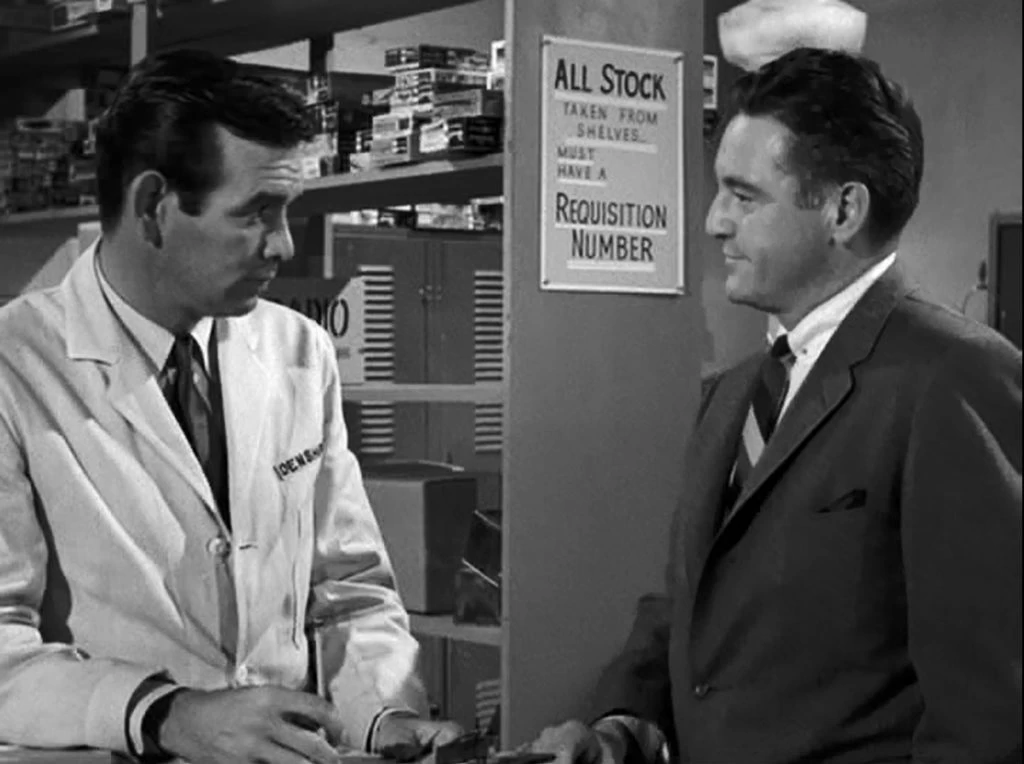
Family is important to Richard Kimble.
Yes, family is important to a lot of us, but the next time any of us think we don’t want to attend a family event because it would be inconvenient, we’d do well to think of the pediatrician from (the fictional) Stafford, Indiana.
In one episode of The Fugitive, the excellent, nail-biting “The Survivors,” Kimble visits his in-laws’ home – because he hears that they are having financial troubles. Kimble, you see, knows of a secret bank account that his wife had kept in case of an emergency. There’s a lot of money in it, enough that could save his father-in-law’s business.
The problem? Kimble’s mother-in-law, Edith, fervently believes that Kimble killed her daughter. The father-in-law, Ed, isn’t so sure. Only is Helen’s youngest sister, Terry, confident that Kimble didn’t do it.
So, presumably having a very good understanding of how his in-laws feel about him from what he saw of them at the trial, Kimble nevertheless wants to help them. And so he comes to (the fictional) Fairfield, Indiana, where Helen’s parents live – knowing that this is a city where a lot of people know him, and where he might be recognized instantly.
And he is, almost as soon as he arrives, and the police are soon after him. Does he escape Fairfield and run for the hills? Or go to his in-laws’ house, anyway, to try to figure out where his late wife hid the information on the secret bank account? If you're familiar with The Fugitive, then you know the answer. Kimble goes to the house, of course.
Does he ask his in-laws for maybe half of the money in Helen's secret bank account once he finds that information? Because it might be helpful to an unemployed doctor on the run. Of course not.
In the episode, "Home is the Hunted," Kimble also sneaks into his own hometown when he reads a newspaper article that offers a hint that his father, also a doctor, might be in poor health. When he realizes his younger brother Ray is struggling in the town – due to now being infamous for having an older brother accused of murder – Kimble sticks around in his hometown far longer than is safe.
“I know everything’s blown up in your face,” a sympathetic Kimble says to Ray. “Your work, your marriage, me. Especially me.”
Kimble urges Ray: “Until I’m cleared, you’ve got to work out some kind of decent life for yourself.”
When Ray admits that he isn’t sure if his brother is innocent, Kimble decides to turn himself in. Of course, Ray doesn’t allow him to do that – and even if you think Kimble was just pretending he was going to turn himself in, there’s no doubt that he has remained in Stafford far longer than he should, because he wanted to make sure his younger brother was going to be okay.
So the next time your mom, dad, or maybe an aunt says that you don’t visit or call enough, think about Richard Kimble.
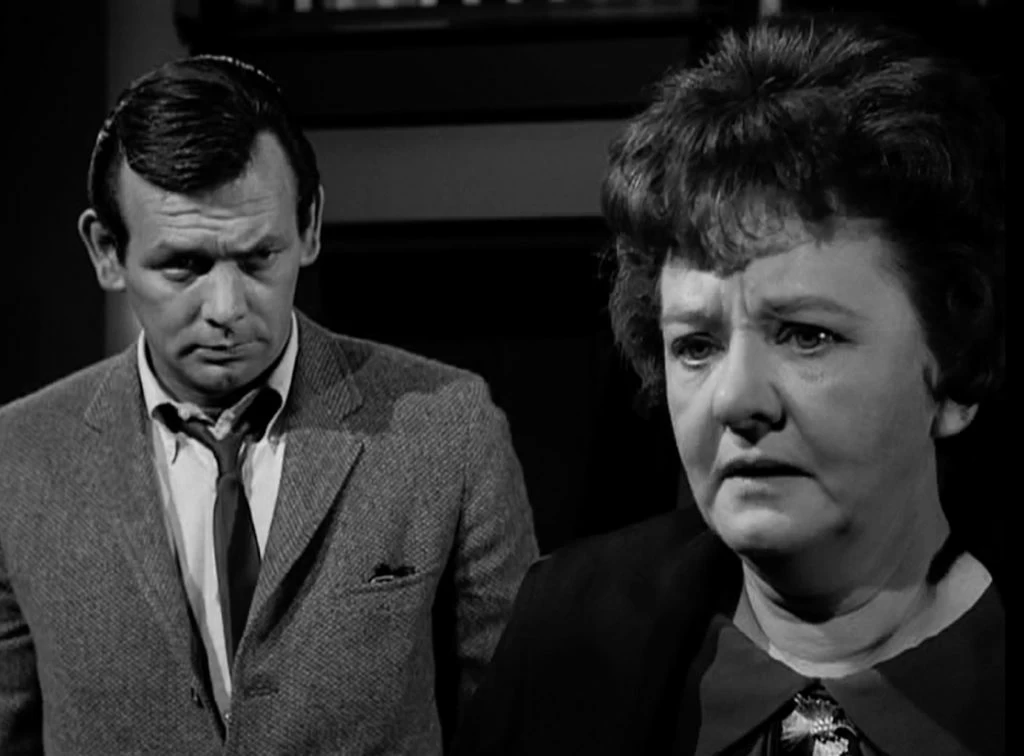
Yet another role model trait: Richard Kimble doesn’t waste his talents.
We often don’t measure up to our full potential. That whole “living your best life” phrase has become popular and what a lot of people strive for – because if you are living your best life, you probably are living up to your full potential.
Well, if anybody would or could be excused for slacking off in his career, it would be Richard Kimble, on the run, drifting from town to town. In order to make ends meet, he has to take a lot of jobs that he is way overqualified for.
In the episode “Smoke Screen,” Kimble is working as a farm laborer – and finds himself with a bunch of laborers somewhat trapped on a mountain that is burning due to a forest fire. Nobody’s worried that they’re going to be overcome by the fire, but for awhile, the roads are impassable. This becomes a problem when one of the laborer’s pregnant wife goes into literal labor.
She needs a C-section, and of course, the woman needs a doctor – but nobody can get her to a doctor due to the impassable roads.
Kimble agonizes over this. You can see it on his face. He doesn't want to be caught. He wants to do everything he can to get this pregnant woman to a physician, one who isn't wanted for murder.
But when it’s clear that they can't get to a doctor, and no doctor can get to them, and the woman will die without a C-section, Kimble tells the nurse (Beverly Garland) that he can deliver the baby.
Of course, the nurse thinks Kimble is nuts, and that’s when he shares with her his qualifications: “I’m a doctor. Cornell Medical School. Interned in New York. Advanced study, Guy's Hospital, London. Resident, Memorial Hospital in Chicago. I specialized in pediatrics and obstetrics. Until I stopped practicing.”
The nurse is flustered – but pushes back. After all, as far as she knows, this guy is a field hand.
“Do you seriously expect me to believe that?”
“The girl's life depends on it,” Kimble replies.
By the end of the episode, Kimble, of course, saves the pregnant woman’s life and brings a baby boy into the world – and escapes the dwindling fire and labor camp, which is now swarming with police, having been alerted that Kimble may be around. Kimble escapes, mostly because the nurse and Maria’s husband cover for him, feigning ignorance about a mysterious doctor who was on hand to deliver a baby via caesarean section.
They say that another field hand, who was a veterinarian in Mexico, helped with the surgery. So the police decide there's nothing to the rumor that Lt. Gerard has passed onto them, that Richard Kimble might be involved and in the area. They don't look for him, and Kimble can keep running.
But when given the chance to use his talents, Kimble didn’t waste that chance. He also, as usual, put somebody else’s needs before his own.
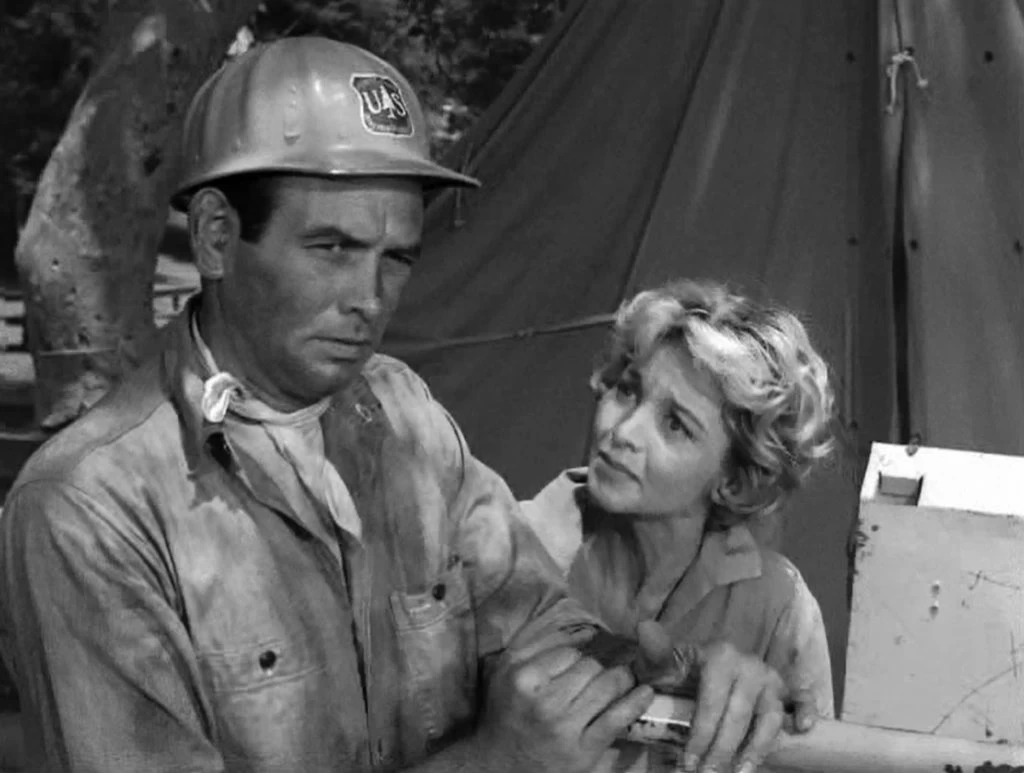
Kimble stands up for himself.
Kimble may be a do-gooder and constantly putting other people’s needs before his own, but he isn’t a doormat. He does look out for himself. He isn’t above lightly breaking the law if he needs to, in order to escape. He might slug a police detective or a security guard who might be trying to stop him from escaping, for instance.
But that’s about it. Kimble stands up for himself – but he never takes it to the extreme or lets the end justify the means. He will never hurt somebody else to help him. He manages to thread that needle, where he tries to look out for himself but also for others. In other words, he will risk getting hurt, to help others, but he tries to take calculated risks.
In “Devil’s Carnival,” Kimble has been jailed for much of the episode and is just about to run for his life – when he sees the sheriff who imprisoned him, wounded outside. (Long story, but somebody else – the bad guy of the episode – shot the officer.)
Kimble isn’t about to leave the sheriff lying wounded outside, even though plenty of people are nearby and would clearly find and help him. No, Kimble is going to drag the sheriff back into the police station and tend to his wounds – and then make his escape.
To that point…
Richard Kimble is ethical – even when it’s inconvenient.
I’m thinking of, well, a lot of episodes. One of the best is “Corner of Hell,” in which Richard Kimble is captured by a family of moonshiners, the Gage family. Later, Lieutenant Philip Gerard searches for Kimble in the same area. Gerard was warned not to go near this family by the local sheriff who says, “Lieutenant, them people hate a stranger. They hate a lawman. They hate a man in a store-bought suit. You’re all three.”
Gerard doesn’t listen and encounters the Gage family, and things don't go well. In fact, Gerard’s car is taken for a joyride by one of the moonshiners, and he goes in pursuit (on foot).
Not long afterward, Gerard is unjustly accused of attacking (but not murdering) the woman who took his car. Gerard is captured, and Tully Gage, the patriarch, and his family decide that they’re going to hang him.
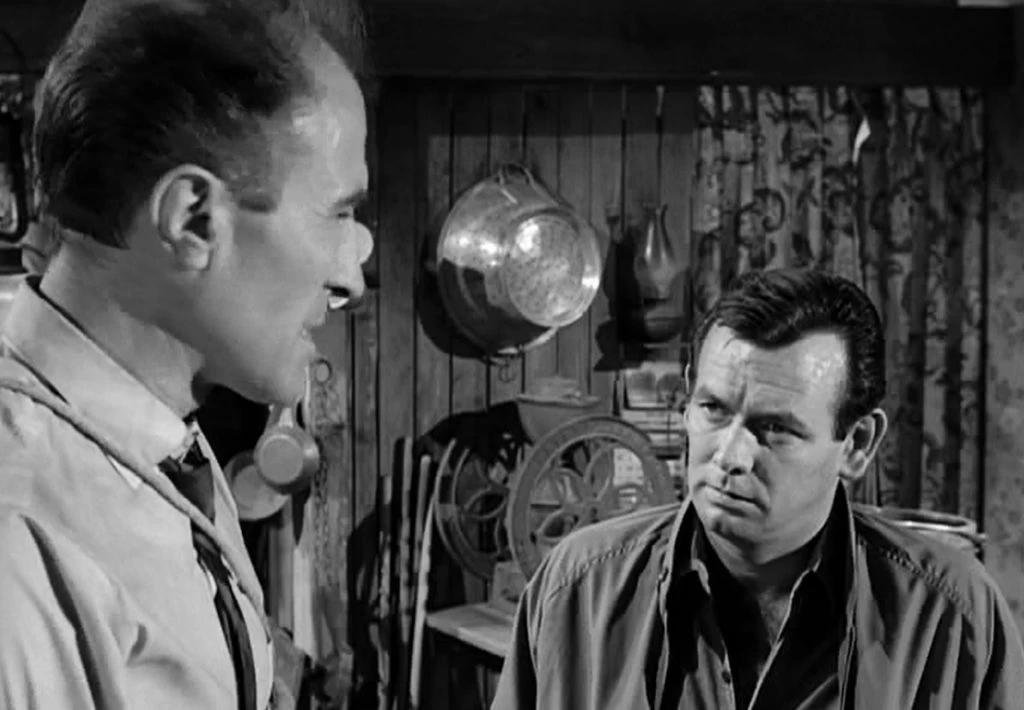
Kimble has been (forcibly) serving as the family’s doctor and is starting to gain their respect and the freedom to roam around. He has the following conversation with Gerard, tied to a chair.
“They’re going to lynch me. That’s murder,” Gerard says.
“Well, in our world, yes. But this isn’t our world,” Kimble says. And then he asks: “What happened, Gerard?”
“I went after my car,” Gerard says. “I found the girl. I saw a man.”
“But you can’t prove it,” Kimble says. And then: “Well, is there anything else? I think I can still make Tully listen.”
“There’s nothing else,” Gerard says, frustrated. “There’s… nothing I can prove.”
Gee, sounds familiar, doesn’t it? Even Gerard sees the irony. In fact, it’s infuriating when Gerard doesn’t believe Kimble’s story, which Kimble also can’t prove. That said, over the series, Gerard does come around to having a grudging respect for Kimble.
But he doesn't have it yet. In the same episode, Kimble says to Gerard, “There’s a man I have to find. A one-armed man. When I find him, I’ll turn myself in." And the lieutenant replies with: “Still sticking to that same tall tale?”
Anyway, as you can imagine, Kimble ends up proving Gerard’s innocence – and saves the lieutenant from meeting a grisly end, hanging from a tree branch.
Kimble could have allowed the family of moonshiners to kill Gerard and probably justified it to himself – but he has a very strong moral compass.
Richard Kimble believes Lieutenant Gerard’s story and will not allow himself to even indirectly be responsible for an innocent man’s murder. Even if that innocent man might one day capture and arrest him and thus lead him to his own death. Now that is the mark of a good role model.
Where to watch The Fugitive (at the time of this writing): The Fugitive can be found for free (well, there are ads) on PlutoTV.com. Unfortunately, it’s only the first two seasons and not even all of the episodes of the first season. Still, it’s better than nothing.
Articles similar to this one: Roy Huggins was the creator of The Fugitive and also, The Rockford Files. So maybe you'd enjoy this look back on the history of the answering machine -- using Jim Rockford's answering machine as the springboard into the topic.
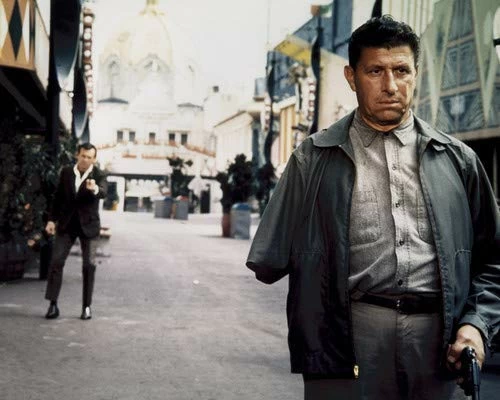

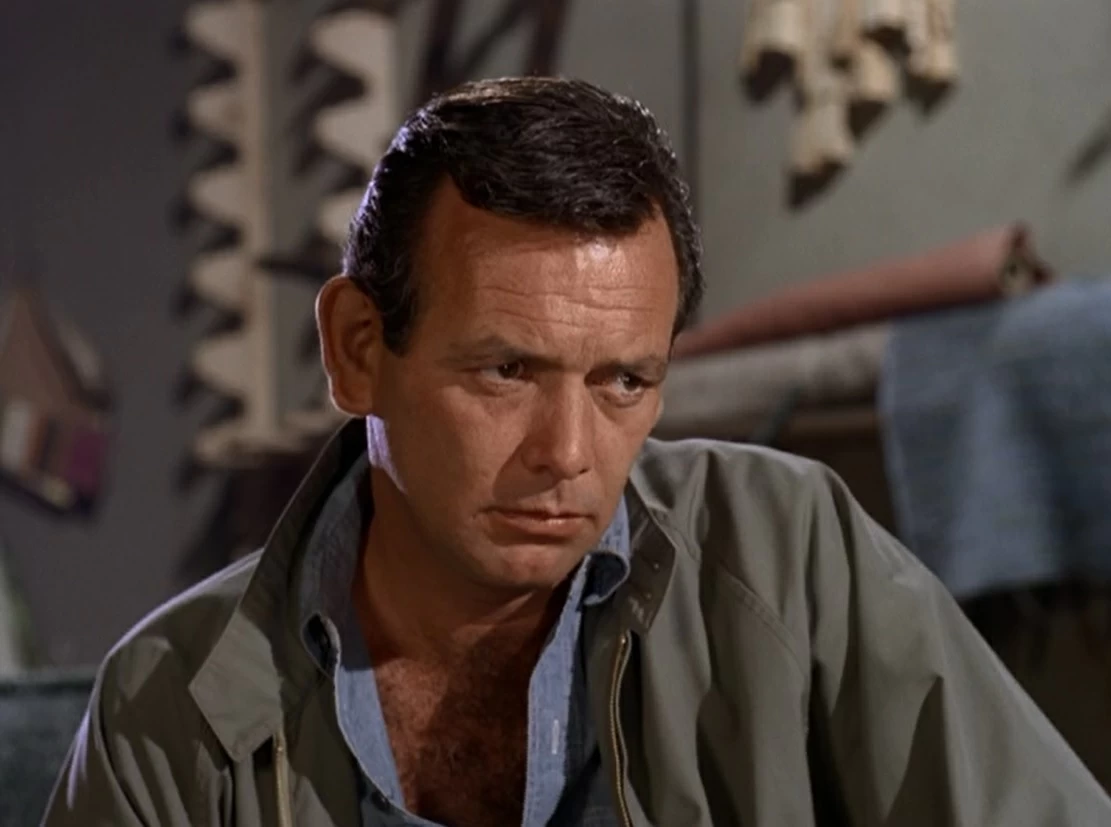
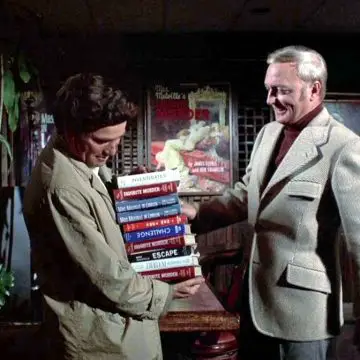
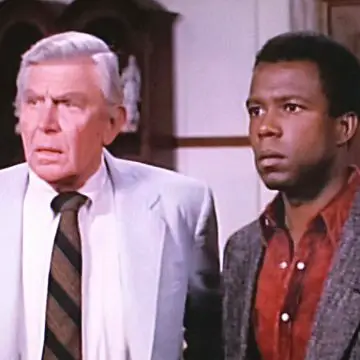
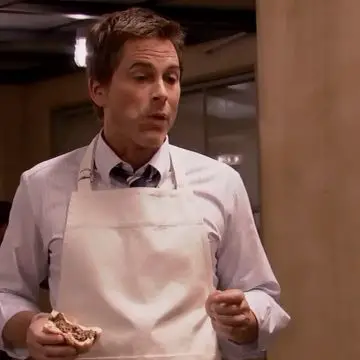
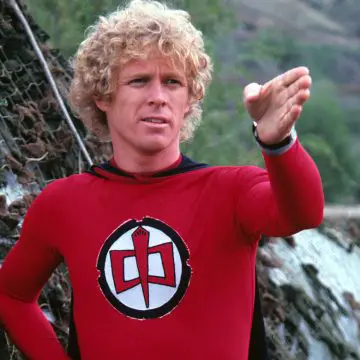
Joan Shannon
RAisch was in the Mercantile Marine not the Marines. In Smokescreen the police were not called in on the film.
The TV Professor
Hi, Joan, thanks! I corrected the bit about Raisch. Geez, I hate making mistakes -- but really appreciate being told about them, to fix them. As for "Smoke Screen," I'll have to go back and look at that, but as I recall, the police were involved at the end of the episode. Nobody called the police; I agree and didn't suggest that in the blog post, I hope. But as I remember it (and watched the episode while writing the blog post), they got wind of Kimble and came up there. I'll have to re-watch that episode, I guess. But, anyway, thanks again for your comments!